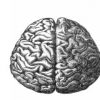DISCERN was built to process and recall simple narratives. Through training, the system learns what words mean and how they work in sentences in a way that mimics activation patterns in the brain. With the original settings, DISCERN is able to digest a narrative, retain it, and reproduce the story in its “own” words. The system also identifies negative and positive aspects of the story to change the likelihood that it will remember a specific detail. In this way, DISCERN models the brain both as a semantic and emotional processor.
When the researchers at UT changed the rate at which DISCERN learned, they noticed drastically different results, After learning a third-person narrative about a mobster, DISCERN retold fragments of the story in the first person, adopting a wild, criminal autobiography. Mistaking who did what to whom, an error called “agent-slotting,” is common among people with schizophrenic symptoms of delusion, and among the human patients used in controls for the study.
When diagnosing and treating schizophrenics, doctors often look for disturbances in storytelling and semantics. Finding those same symptoms in DISCERN has strengthened a theory that hyper-learning causes schizophrenia. (via Researchers Create A Schizophrenic Computer – IEEE Spectrum)
